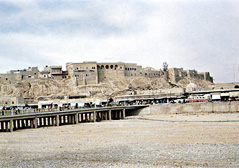

(AINA) -- The precipitous disintegration of Iraqi armed forces towards the end of "Operation Iraqi Freedom" led to a provocative advance of Kurdish forces into the cities of Mosul and Karkuk. The ensuing looting and terror raids against the majority non-Kurdish residents of those cities have led to increased ethnic tension. American forces that were supposed to secure the urban areas in order to prevent just such terror raids by Kurds did not arrive until Kurdish bands looted and ransacked the cities unhindered.
 |
| Karkuk (Syriac name: Karka d'Bait Sluk) was founded as an Assyrian city millennia ago. It sacrificed hundreds of thousands of martyrs. |
The ensuing Iraqi and international outrage over the lack of security in these areas in northern Iraq as well as elsewhere led to recent renewed efforts by the US to reign in Kurdish terror squads. First, in a setback to Kurdish aspirations to proclaim the Assyrian founded city of Karkuk (AINA 5-16-2000) as a "Kurdish Capital," a local governing council of 24 people was established that consisted of Assyrian (also known as Chaldean and Syriac), Turkman, Arabs, and Kurds in equal numbers. The six Assyrian representatives included Dr. Emil Nasir Azo, Mr. Sabah Nasir Hindi, Mr. Edward Oraham Odisho, Mr. Sargon Lazar Sliwa, Mr. Ashour Yalda, and Mr. Issac Poulus Mansour. In the ancient Assyrian capital of Nineveh (modern day Mosul), elections on May 5, 2003 yielded Assyrian Christians three representatives out of twenty-four, including Dr. Yousif Hanna Lallu, Rev. Lewis Sako, and Mr. Ghani Salim Sofiya. Although grossly inadequate in terms of what the indigenous Assyrians would consider fair representation in their historic heartland and ancient capital, the development was nonetheless noteworthy and welcome for a population starved of security and government services.
As part of the American drive to stabilize the major urban areas, American troops recently began to disarm Kurdish forces and urge their withdrawal. Reports from Reuters on April 26 noted a near Kurdish military confrontation with American forces trying to disarm armed Kurds in Mosul. According to Reuters, "US forces identified three roadblocks in the city manned by 'pesh merga' fighters loyal to the Kurdish Democratic Party (KDP) and moved in hundreds of soldiers to take them over." Apparently, Kurdish fighters attempted to reinforce one of their positions with dozens of fighters until a US Kiowa attack helicopter circled overhead. Reportedly, one US Army Captain told a Kurd paramilitary leader "that if he did not tell his men to pull back 'you will see more firepower than you would dare dream about.'" Lieutenant Colonel Chris Holden of the US Army added "Our intention is to disarm them. We want the pesh merga to leave and we will continue raising the bar on their compliance until they have left the city."
Although developments in Karkuk and Mosul did give some hope for future stability in those areas, Assyrians have remained deeply troubled by the Kurdish paramilitary advance into Assyrian villages and cities especially in the environs around Mosul following the conclusion of the war (AINA 4-19-2003). Caught between competing interests and escalating tensions between Turkey and the Kurds, the US had brokered an agreement whereby the Kurds would advance towards the surrounding villages around Karkuk and Mosul but not enter the cities themselves in exchange for a pledge by Turkey not to invade the oil rich northern Iraqi cities. The resulting Kurdish advance led to the early occupation of such prominent Assyrian towns and villages as Telkepe, Telasqos, Bahzani, Sharafea, Alqosh, Bartella, Karamlis, and Baghdedi among others.
Still unconfirmed reports from northern Iraq now note that American forces may have begun asking Kurds to leave Assyrian villages. As an example, Telkepe is now believed to be free of Kurdish occupation. Others such as Alqosh, Karamlis, Bartella, and Baghdedi remain occupied.
 |
| 54 year old Hazim Petrus Damman murdered on April 10, 2003 by Kurdish terrorists in Karkuk, Iraq. |
To Assyrians still feeling the terror and intimidation of Kurdish occupation in the former UN administered "Safe Haven," the Kurds simply used the security vacuum at the conclusion of the war to further occupy still more Assyrian villages. Anticipating the Kurdish advance, Assyrian military personnel were deployed during the war not so much to defend against retreating Iraqi forces, but rather to protect from marauding Kurdish paramilitary forces. Assyrians continue to bitterly complain that prior to the war, Assyrian political organizations had been actively involved in the opposition to the government. As one Assyrian analyst noted, "the Assyrian Democratic Movement (ADM) had been designated as a legitimate recipient of aid under the Iraqi Liberation Act and the ADM has been one of the core group of eight major opposition groups. Assyrians had fully supported regime change. Why, then do Kurdish thugs have to occupy Assyrian villages already under Assyrian opposition protection? There are absolutely no Kurdish residents in these villages. There is absolutely no reason for them to be there."
The growing anger amongst Assyrians is leading to greater calls for Kurdish withdrawal not just from recently occupied villages but the over 250 other villages in northern Iraq held by Kurds. Another Assyrian activist noted "These villages constitute the Assyrian heartland and should form the very nucleus of a future Assyrian local self-administrative area needed to protect Assyrian survival in any future Iraq. For Assyrians to survive and thrive in the new Iraq, such areas need to be preserved as an Assyrian sanctuary- free from threat and intimidation."

or register to post a comment.